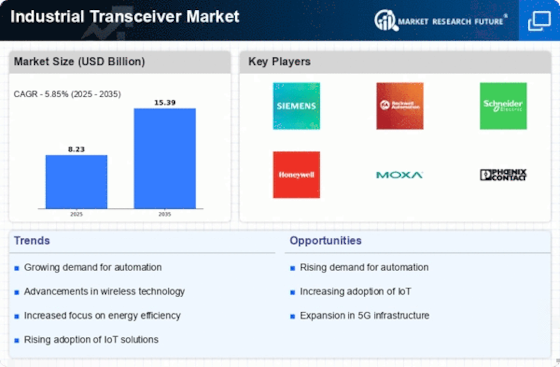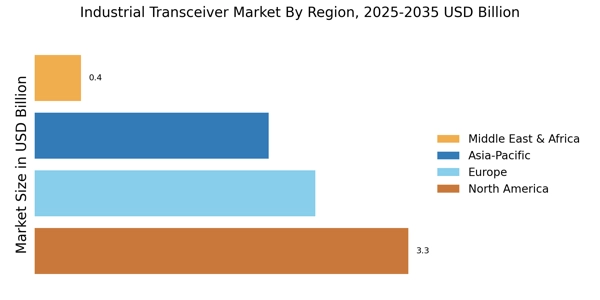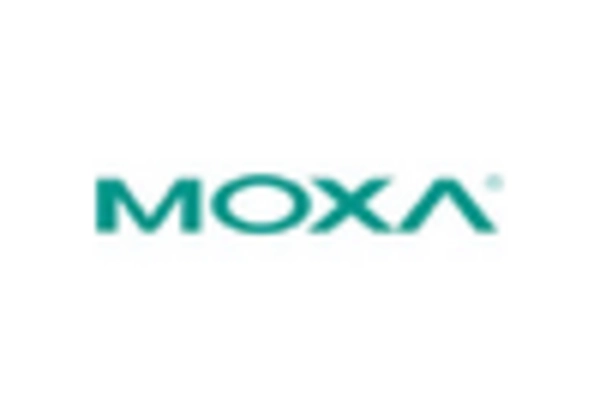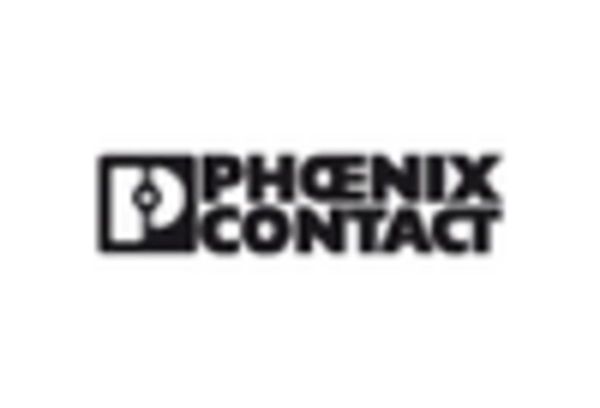Growing Focus on Energy Efficiency
The Industrial Transceiver Market is also benefiting from a growing focus on energy efficiency across various sectors. Industries are increasingly seeking solutions that not only enhance productivity but also reduce energy consumption. Industrial transceivers contribute to this goal by enabling more efficient communication and control systems, which can lead to optimized energy usage. Recent studies indicate that energy-efficient technologies can reduce operational costs by up to 30%, making them attractive to manufacturers. As energy regulations become more stringent, the demand for industrial transceivers that support energy-efficient operations is likely to increase, further driving growth in the Industrial Transceiver Market.
Rising Adoption of Smart Manufacturing
The Industrial Transceiver Market is experiencing a notable surge in the adoption of smart manufacturing practices. This trend is driven by the need for enhanced operational efficiency and productivity. As industries increasingly integrate advanced technologies, the demand for reliable communication systems becomes paramount. Smart manufacturing relies heavily on real-time data exchange, which is facilitated by industrial transceivers. According to recent data, the market for smart manufacturing is projected to grow at a compound annual growth rate of over 10%, indicating a robust demand for industrial transceivers that support these technologies. This growth is likely to propel the Industrial Transceiver Market forward, as manufacturers seek to optimize their processes and reduce downtime.
Increased Investment in Automation Technologies
The Industrial Transceiver Market is experiencing increased investment in automation technologies, which is a key driver of market growth. As companies strive to enhance operational efficiency and reduce labor costs, the adoption of automation solutions is becoming more prevalent. Industrial transceivers are integral to these automation systems, providing the necessary communication links between various components. Recent reports indicate that the automation market is projected to grow significantly, with investments reaching billions of dollars annually. This trend suggests a strong demand for industrial transceivers, as they are essential for the successful deployment of automation technologies across diverse industrial applications.
Expansion of Industrial Internet of Things (IIoT)
The Industrial Transceiver Market is significantly influenced by the expansion of the Industrial Internet of Things (IIoT). As industries increasingly adopt IIoT solutions, the need for efficient and reliable communication between devices becomes critical. Industrial transceivers play a vital role in enabling seamless connectivity among various IIoT devices, facilitating data collection and analysis. The IIoT market is expected to witness substantial growth, with estimates suggesting it could reach a valuation of several hundred billion dollars in the coming years. This growth trajectory indicates a strong demand for industrial transceivers, as they are essential for the successful implementation of IIoT strategies within manufacturing and other industrial sectors.
Advancements in Wireless Communication Technologies
The Industrial Transceiver Market is witnessing advancements in wireless communication technologies, which are reshaping the landscape of industrial communication. The shift towards wireless solutions is driven by the need for flexibility and scalability in industrial environments. Wireless industrial transceivers offer the advantage of reducing installation costs and improving mobility within manufacturing facilities. As industries continue to embrace wireless technologies, the demand for advanced industrial transceivers is expected to rise. Market forecasts suggest that the wireless communication segment within the Industrial Transceiver Market could experience a growth rate exceeding 15% over the next few years, indicating a robust trend towards wireless solutions.
















